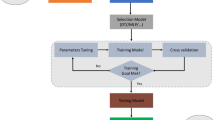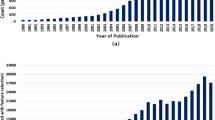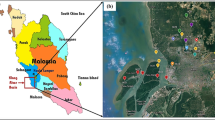Abstract
Considering the time-varying, uncertain and non-linear properties of the wastewater treatment process (WWTPs), a novel multi-kernel relevance vector machine (MRVM) soft sensor based on time difference (TD) is proposed to predict the quality-relevant but difficult-to-measure variable. Firstly, a novel dimension reduction technique is introduced to reduce data dimension and model complexity. Secondly, the parameters of the kernel model are optimized by the intelligent optimization algorithm (PSO). Besides, the TD strategy is introduced to enhance the robustness of MRVM when exposing to dynamic environments. Finally, the proposed model was assessed through two simulation studies and a real WWTP with the results demonstrating the effectiveness of the proposed model.

Framework of Lasso-TD-MRVM soft sensor model









Similar content being viewed by others
References
Alex J, Benedetti L, Copp J, Gernaey KV, Jeppsson U, Nopens I, Pons N, Rieger L, Rosen C, Steyer JP, Vanrolleghem P, Winkler S (2008) Benchmark simulation model No. 1 (BSM1). Technical report, Department of industrial electrical engineering and automation, Lund University. http://lup.lub.lu.se/record/4391579
Bo S, Yu L, Zili W, Zhifeng L, Quan X, Yi R, Qiang F, Dezhen Y, Cheng Q (2020) Physics-of-failure and computer-aided simulation fusion approach with a software system for electronics reliability analysis. Eksploat Niezawodn 22:340–351. https://doi.org/10.17531/ein.2020.2.17
Chitralekha Saneej B, Shah Sirish L (2010) Application of support vector regression for developing soft sensors for nonlinear processes. Can J Chem Eng 88:696–709. https://doi.org/10.1002/cjce.20363
Duvenaud D (2014) Automatic model construction with Gaussian processes. Dissertation, University of Cambridge https://doi.org/10.17863/CAM.14087
Ge Z, Song Z (2010) Nonlinear soft sensor development based on relevance vector machine. Ind Eng Chem Res 49:8685–8693. https://doi.org/10.1021/ie101146d
Gonen M, Alpaydin E (2011) Multiple kernel learning algorithms. J Mach Learn Res 12:2211–2268 https://dl.acm.org/doi/10.5555/1953048.2021071. Accessed 7 Nov 2011
Gönen M, Alpaydın E (2013) Localized algorithms for multiple kernel learning. Pattern Recogn 46:795–807. https://doi.org/10.1016/j.patcog.2012.09.002
Guo X, Yang J, Wu C, Wang C, Liang Y (2008) A novel LS-SVMs hyper-parameter selection based on particle swarm optimization. Neurocomputing 71: 3211–3215. https://doi.org/10.1016/j.neucom. 2008.04.027
Haimi H, Mulas M, Corona F, Vahala R (2013) Data-derived soft-sensors for biological wastewater treatment plants: an overview. Environ Model Softw 47:88–107. https://doi.org/10.1016/j.envsoft.2013.05.009
Kadlec P, Gabrys B, Strandt S (2009) Data-driven soft sensors in the process industry. Comput Chem Eng 33:795–814. https://doi.org/10.1016/j.compchemeng.2008.12.012
Kaneko H, Funatsu K (2013) Classification of the degradation of soft sensor models and discussion on adaptive models. AICHE J 59:2339–2347. https://doi.org/10.1002/aic.14006
Kaneko H, Funatsu K (2014) Adaptive soft sensor based on online support vector regression and Bayesian ensemble learning for various states in chemical plants. Chemom Intell Lab Syst 137:57–66. https://doi.org/10.1016/j.chemolab.2014.06.008
Kaneko H, Funatsu K (2015) Moving window and just-in-time soft sensor model based on time differences considering a small number of measurements. Ind Eng Chem Res 54:700–704. https://doi.org/10.1016/j.chemolab.2014.06.008
Lee WJ, Verzakov S, Duin RPW (2007) Kernel combination versus classifier combination. International Workshop on Multiple Classifier Systems 22-31. https://doi.org/10.1007/978-3-540-72523-7_3
Lin Y, Xia K, Jiang X, Bai J, Wu P (2016) Landslide susceptibility mapping based on particle swarm optimization of multiple kernel relevance vector machines: case of a low hill area in Sichuan Province, China. ISPRS Int J Geo Inf 5:191. https://doi.org/10.3390/ijgi5100191
Liu Y (2017) Adaptive just-in-time and relevant vector machine based soft-sensors with adaptive differential evolution algorithms for parameter optimization. Chem Eng Sci 172:571–584. https://doi.org/10.1016/j.ces.2017.07.006
Liu Y, Zhang L, Zhang SX, Liu JW (2010) Comparison research of single kernel and multi-kernel relevance vector machine. Computer Engineering 36:195–197. https://doi.org/10.3969/j.issn.1000-3428.2010.12.067
Liu Y, Chen J, Sun Z, Li Y, Huang D (2014) A probabilistic self-validating soft-sensor with application to wastewater treatment. Comput Chem Eng 71:263–280. https://doi.org/10.1016/j.compchemeng.2014.08.008
Liu Y, Pan Y, Huang D, Wang Q (2017) Fault prognosis of filamentous sludge bulking using an enhanced multi-output Gaussian processes regression. Control Eng Pract 62:46–54. https://doi.org/. https://doi.org/10.1016/j.conengprac.2017.02.003
Liu Y, Liu B, Zhao X, Xie M (2018) Development of RVM-based multiple-output soft sensors with serial and parallel stacking strategies. IEEE Trans Control Syst Technol:1–8. https://doi.org/10.1109/TCST.2018.2871934
Luo F, Qiao X, Liao W (2017) Soft-sensing modeling based on GK-LSSVM method for online predictions of BOD in activated sludge process. International Conference on Robotics and Automation Sciences pp 134–138. https://doi.org/10.1109/ICRAS.2017.8071931
Motai Y (2015) Kernel association for classification and prediction: a survey. IEEE Trans Neural Netw Learn Syst 26:208–223. https://doi.org/10.1109/tnnls.2014.2333664
Nikolić V, Motamedi S, Shamshirband S, Petković D, Ch S, Arif M (2016) Extreme learning machine approach for sensorless wind speed estimation. Mechatronics 34:78–83. https://doi.org/10.1016/j.mechatronics.2015.04.007
Qin SJ (1998) Recursive PLS algorithms for adaptive data modeling. Comput Chem Eng 22:503–514. https://doi.org/10.1016/S0098-1354(97)00262-7
Souza FAA, Araújo R, Mendes J (2016) Review of soft sensor methods for regression applications. Chemom Intell Lab Syst 152:69–79. https://doi.org/10.1016/j.chemolab.2015.12.011
Tibshirani R (2011) Regression shrinkage and selection via the lasso: a retrospective. J R Stat Soc Ser B Stat Methodol 73:273–282. https://doi.org/10.1111/j.1467-9868.2011.00771.x
Tipping ME (2001) Sparse Bayesian learning and the relevance vector machine. J Mach Learn Res 1:211–244. https://doi.org/10.1162/15324430152748236
Vapnik VN (1999) An overview of statistical learning theory. IEEE Trans Neural Netw 10:988–999. https://doi.org/10.1109/72.788640
Xiao H, Bai B, Li X, Liu J, Liu Y, Huang D (2019) Interval multiple-output soft sensors development with capacity control for wastewater treatment applications: a comparative study. Chemom Intell Lab Syst 184:82–93. https://doi.org/10.1016/j.chemolab.2018.11.007
Xiong W, Li Y, Zhao Y, Huang B (2017) Adaptive soft sensor based on time difference Gaussian process regression with local time-delay reconstruction. Chem Eng Res Des 117:670–680. https://doi.org/10.1016/j.cherd.2016.11.020
Yan F, Kittler J, Mikolajczyk K, Tahir MA (2009) Non-sparse multiple kernel learning for fisher discriminant analysis. The Ninth IEEE International Conference on Data Mining. 1064–1069 https://doi.org/10.1109/ICDM.2009.84
Yu-ge X, Tao C, Fei L (2014) Wastewater effluent quality prediction model based on relevance vector machine. J South China Univ Technol (Nat Sci Ed) 42:103–108. https://doi.org/10.3969/j.issn.1000-565X.2014.05.016
Zhao L, Dai T, Qiao Z, Sun P, Hao J, Yang Y (2019) Application of artificial intelligence to wastewater treatment: a bibliometric analysis and systematic review of technology, economy, management, and wastewater reuse. Process Saf Environ Prot 133:169–182. https://doi.org/. https://doi.org/10.1016/j.psep.2019.11.014
Funding
This work was financially supported by the National Natural Science Foundation of China (61873096, 61673181), the Basic and Applied Basic Research Foundation of Guangdong Province (2020A1515011057), and the Science and Technology Planned Project of Guizhou Province ([2020]1Y276).
Author information
Authors and Affiliations
Contributions
All authors contributed to the study conception and design. Material preparation, data collection, and analysis were performed by Hongchao Cheng, Longhua Yuan, and Lingying Yao. The first draft of the manuscript was written by Jing Wu. The writing-review and editing were performed by Yiqi Liu. The funding was provided by Daoping Huang and Yiqi Liu. All authors commented on previous versions of the manuscript. All authors read and approved the final manuscript.
Corresponding author
Additional information
Responsible Editor: Marcus Schulz
Publisher’s note
Springer Nature remains neutral with regard to jurisdictional claims in published maps and institutional affiliations.
Highlights
• A soft sensor is proposed to predict the quality variables in wastewater treatment.
• Multi-kernel learning is developed to enhance the relevant vector machine model.
• The Lasso is used to reduce data dimension and model complexity.
• The TD is imposed on Multi-kernel RVM to improve the dynamics of soft sensor.
• A data set with filamentous sludge bulking is used to validate the proposed framework.
Electronic supplementary material
ESM 1
(DOCX 30 kb)
Rights and permissions
About this article
Cite this article
Wu, J., Cheng, H., Liu, Y. et al. Learning soft sensors using time difference–based multi-kernel relevance vector machine with applications for quality-relevant monitoring in wastewater treatment. Environ Sci Pollut Res 27, 28986–28999 (2020). https://doi.org/10.1007/s11356-020-09192-3
Received:
Accepted:
Published:
Issue Date:
DOI: https://doi.org/10.1007/s11356-020-09192-3




